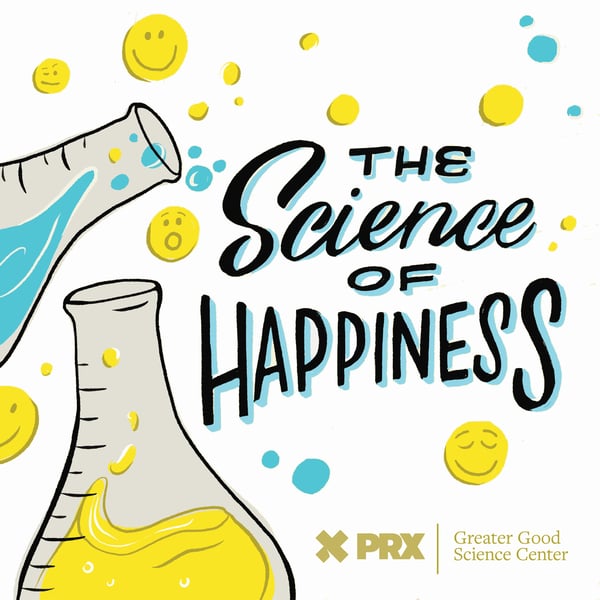How Art Heals Us
The Science of Happiness
PRX and Greater Good Science Center
4.4 • 1.9K Ratings
🗓️ 8 May 2025
⏱️ 24 minutes
🧾️ Download transcript
Summary
We explore how making art can ground us in the present and be a space of healing, connection, and joy.
Summary: We explore how creative expression can support emotional resilience and physical healing in the face of life’s hardest moments and how simple acts of art-making— whether painting, drawing, or doodling—can offer grounding, release, and joy.
This episode is made possible through the generous support of the John Templeton Foundation.
Scroll down for a transcription of this episode.
Guests:
SHABNAM PIRYAEI is an award-winning writer, filmmaker, and teacher.Learn more about Shabnam here: https://shabnampiryaei.com/
Follow Shabnam on Instagram here: @shabnampiryaei
DR. GIRIJA KAIMAL is a leading researcher in art therapy who has studied how creative expression supports people.
Learn more about Dr. Kaimal here: https://girijakaimal.com/
Related The Science of Happiness episodes:
Why Grownups Should Be Playful Too: https://tinyurl.com/4r85dc7m
Why Going Offline Might Save Us: https://tinyurl.com/e7rhsakj
How Awe Helps You Navigate Life’s Challenges: https://tinyurl.com/2466rnm4
Related Happiness Breaks:
Sketching Serenity: https://tinyurl.com/mpv3d7ey
Making Space For You: https://tinyurl.com/yk6nfnfv
A Self-Compassion Meditation For Burnout: https://tinyurl.com/485y3b4y
Tell us about your experience creating art. Email us at [email protected] or follow on Instagram @HappinessPod.
Help us share The Science of Happiness! Leave us a 5-star review on Apple Podcasts and share this link with someone who might like the show: https://tinyurl.com/2p9h5aap
Transcription: https://tinyurl.com/yc77fkzu
Transcript
Click on a timestamp to play from that location
| 0:00.0 | This episode is made possible through the generous support of the John Templeton Foundation. |
| 0:09.6 | My father has dementia and I'm his only caretaker. And there's something about that always being in the background. |
| 0:18.2 | My father has no living family apart from essentially me and my son. |
| 0:23.6 | He's at a place where we need to be visiting him every day or every other day. |
| 0:29.6 | Otherwise, it's unsustainable, you know. |
| 0:31.6 | And so that's the level of caretaking that's happening. |
| 0:34.6 | The way that we kind of nourish him and keep him buoyant is by visiting him, |
| 0:38.5 | and my son does that with me. This is sort of the lifeline for him right now. It's almost |
| 0:42.7 | like his purpose, is seeing my son, seeing his grandson. What nourishes him the most is just |
| 0:48.0 | having loving interactions with us, you know. He was a poet and really encouraged me to be |
| 0:54.0 | creative and create all the time. |
| 0:56.4 | And so art and literature and music has been in my life since I was born. |
| 1:01.9 | And so a couple days ago, my son and I packed some paper and some pencils. |
| 1:06.4 | And we went to my dad's apartment that I've gotten for him. |
| 1:09.4 | He lives by himself. |
| 1:17.6 | And I was thinking about what's the art that we could do together that would be the most collaborative. You know, thinking about art making as a way of being, as a way that you move through the world, |
| 1:23.6 | rather than it's sort of like a start and end-time practice. |
| 1:33.9 | Welcome to the Science of Happiness. I'm Dachry Keltner. |
| 1:39.4 | There is a growing body of science showing that creating art can be deeply healing, |
| 1:44.6 | calming our nerves, lifting our mood, and helping us process tough emotions. |
| 1:50.1 | So this Mental Health Awareness Month, we're kicking off a series about how art can support our bodies and minds. Today we're joined by Shabnan PBI, an award-winning writer, |
| 1:56.9 | filmmaker, and teacher who recently turned to visual art as a form of self-care, things |
... |
Please login to see the full transcript.
Disclaimer: The podcast and artwork embedded on this page are from PRX and Greater Good Science Center, and are the property of its owner and not affiliated with or endorsed by Tapesearch.
Generated transcripts are the property of PRX and Greater Good Science Center and are distributed freely under the Fair Use doctrine. Transcripts generated by Tapesearch are not guaranteed to be accurate.
Copyright © Tapesearch 2025.

